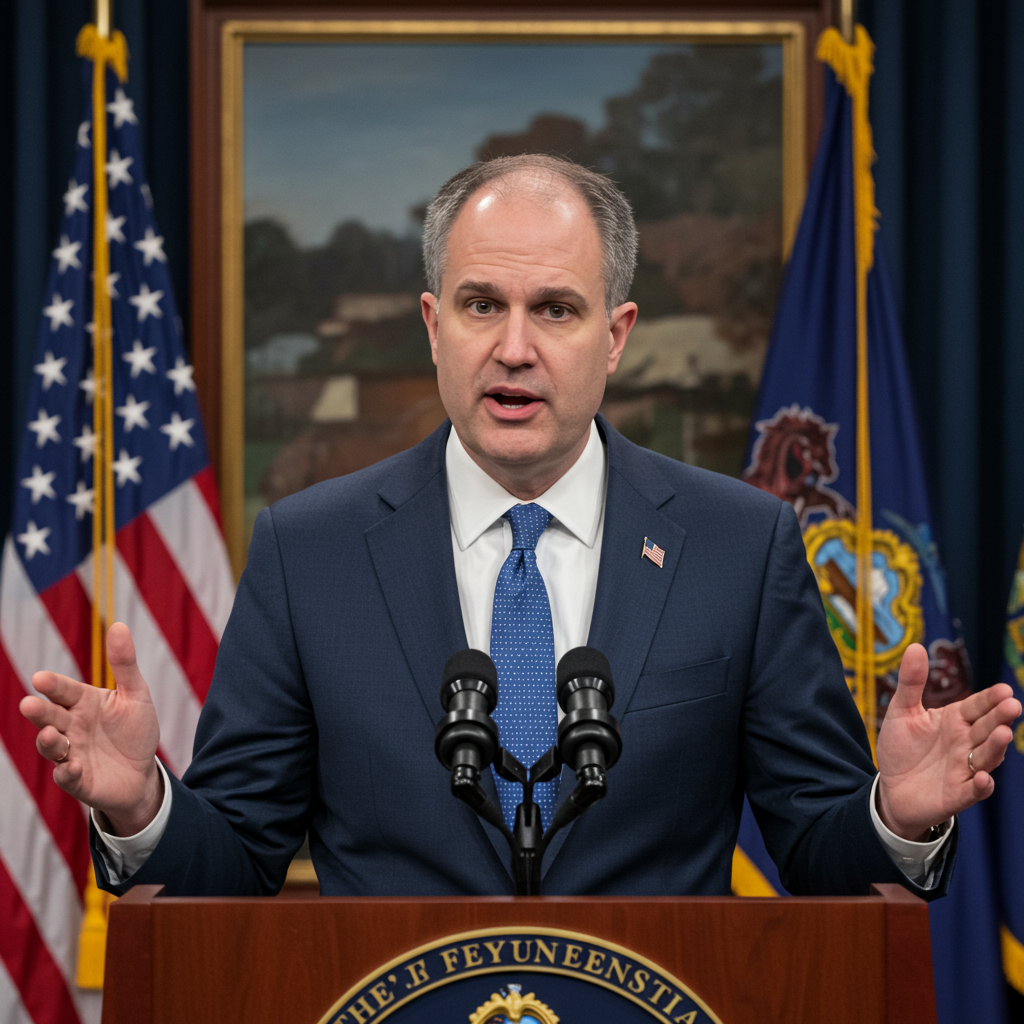Pennsylvania has announced a landmark change in its public health policy, instructing all residents and medical providers statewide to seek vaccine advice from established professional medical associations rather than the federal Department of Health and Human Services (HHS). This decisive move, spearheaded by Governor Josh Shapiro, marks a significant departure from traditional reliance on federal health agencies, underscoring the state’s commitment to evidence-based recommendations amidst growing concerns over federal guidance. The policy ensures Pennsylvanians receive clear, trusted information directly from medical experts.
Why Pennsylvania Diverged from Federal Vaccine Guidance
The catalyst for Pennsylvania’s bold new approach stems from a perceived decline in credibility within federal health leadership. State officials have openly expressed apprehension regarding the direction of the HHS, specifically under Secretary Robert F. Kennedy Jr. Historically, the Centers for Disease Control and Prevention (CDC) served as the primary, unquestioned authority for vaccine information for physicians, pharmacists, and public health professionals across the nation. However, Pennsylvania now views the agency’s standing as compromised.
The shift reflects mounting concerns over Secretary Kennedy’s promotion of various unproven theories concerning vaccines, autism, and other health topics. These actions, state officials believe, have eroded public and professional trust in federal recommendations. The situation intensified following recent decisions by Kennedy’s appointed vaccine advisory panel, which notably declined to recommend the latest COVID-19 shots. Such actions, diverging from broader medical consensus, directly contributed to Pennsylvania’s decision to forge its own path for public health policy.
Pennsylvania’s New Compass: Trusted Medical Organizations
To counteract what Governor Shapiro described as the federal government “sowing confusion,” the Pennsylvania Department of Health is now explicitly directing both patients and medical professionals to three highly respected, evidence-based medical associations for immunization guidance:
The American Academy of Pediatrics (AAP): This organization provides comprehensive recommendations for the health and well-being of infants, children, adolescents, and young adults.
The American Academy of Family Physicians (AAFP): Representing family doctors, the AAFP offers guidelines covering health care for all ages, emphasizing preventive care and chronic disease management.
The American College of Obstetricians and Gynecologists (ACOG): ACOG sets standards and provides guidance for women’s health care, including critical maternal and reproductive health vaccine recommendations.
These groups are renowned for their rigorous, peer-reviewed processes and reliance on collective scientific understanding, not individual political appointments. Their recommendations are built on decades of research and clinical practice, offering a stable and trusted health advice platform for Pennsylvania’s residents and healthcare system.
Expanding the Mandate: A Statewide Effort
Initially, only pharmacists in Pennsylvania were advised to look to these professional medical groups for guidance on who should receive specific vaccines and when. The recent announcement broadens this directive significantly, now applying to all* medical providers across the state. This comprehensive expansion underscores Pennsylvania’s commitment to ensuring a unified and reliable source of vaccine advice PA for every doctor’s office, clinic, and pharmacy. The state is consolidating its public health message to remove any ambiguity stemming from federal discord.
Addressing Specific Controversies: COVID-19 and Pediatric Shots
The federal advisory panel’s controversial recommendations further solidified Pennsylvania’s resolve. Beyond rejecting the latest COVID-19 shots, the panel also advised against a combined measles, mumps, rubella, and chickenpox (MMRV) vaccine for children under four years old. While experts acknowledged some clinical considerations behind this specific MMRV recommendation, they also warned it could needlessly restrict the choices available to parents and doctors. The potential for such limitations, coupled with the broader pattern of questionable federal guidance, reinforced the state’s urgency to establish independent, reliable immunization schedules.
Governor Shapiro’s statement was unequivocal: “While the federal government sows confusion, here in Pennsylvania, we are providing clear, evidence-based guidance to ensure Pennsylvanians and their doctors have trusted sources of information.” This declaration highlights a proactive state-level effort to safeguard public health and maintain high standards of medical care, free from vaccine misinformation and political interference.
Navigating the Nuances: FDA Guidelines and Insurance Coverage
It’s crucial to understand that while Pennsylvania is redirecting its primary source for vaccine advice, certain federal regulations still apply. Specifically, pharmacists in Pennsylvania must continue to follow guidance from the U.S. Food and Drug Administration (FDA). This FDA guidance currently limits COVID-19 vaccine administration to individuals aged 65 and older, and younger people with underlying health conditions, unless a prescription is provided to override these rules. The FDA’s role in vaccine approval and safety remains paramount, even as the state redefines its sources for usage recommendations.
On a positive note for residents, the Pennsylvania Department of Health has assured that insurance coverage will continue for all vaccinations recommended by the CDC as of the previous year. This provides continuity and financial accessibility for essential preventive care. To assist residents and providers, links to the recommended vaccine schedules from the three professional medical groups are readily available on the Pennsylvania Department of Health website. This online resource serves as a vital hub for accessing the most current and expert-backed vaccine information.
Broader Implications: Trust, Public Health, and State Autonomy
Pennsylvania’s decision is more than just a policy adjustment; it’s a significant statement on the importance of medical expertise and the role of state governments in public health. This move highlights a growing national challenge regarding federal health agencies and public trust, especially in a post-pandemic world where health information can be highly politicized. By prioritizing medical professional associations known for their scientific rigor, Pennsylvania is setting a precedent that other states might consider if they, too, face similar concerns about federal guidance. This reassertion of state autonomy in health matters could redefine inter-governmental public health strategies.
The underlying message is clear: for critical public health interventions like vaccination, the consensus of the medical community should prevail. This proactive step by Pennsylvania aims to rebuild and maintain public confidence in vaccine recommendations, ensuring that health decisions are informed by the highest standards of scientific evidence and professional consensus, safeguarding the overall health of its citizens.
Frequently Asked Questions
Why did Pennsylvania decide to shift its primary vaccine guidance away from federal sources?
Pennsylvania shifted its vaccine guidance primarily due to concerns over the credibility of the federal Department of Health and Human Services (HHS) under Secretary Robert F. Kennedy Jr. State officials cited Kennedy’s promotion of “unproven theories” about vaccines and the perceived deterioration of the Centers for Disease Control and Prevention’s (CDC) standing. Governor Josh Shapiro emphasized the need for “clear, evidence-based guidance” to combat federal “confusion,” particularly after a federal advisory panel made controversial recommendations regarding the latest COVID-19 and certain pediatric vaccines.
Which specific medical organizations are now providing Pennsylvania’s official vaccine recommendations?
Pennsylvanians and all medical providers statewide are now directed to consult three specific professional medical associations for official vaccine advice PA. These are the American Academy of Pediatrics (AAP), the American Academy of Family Physicians (AAFP), and the American College of Obstetricians and Gynecologists (ACOG). These organizations are recognized for their commitment to evidence-based medicine and providing consensus-driven, reliable immunization schedules. Links to their recommended schedules are available on the Pennsylvania Department of Health website.
How does Pennsylvania’s new vaccine guidance impact COVID-19 shot availability and insurance coverage?
While Pennsylvania has changed its primary source for general vaccine advice, federal U.S. Food and Drug Administration (FDA) guidelines still apply to COVID-19 vaccines. Pharmacists must adhere to FDA rules limiting these shots to individuals 65 and older, or younger people with underlying conditions, unless a prescription is provided. Regarding insurance, the Pennsylvania Department of Health has assured residents that coverage will continue for all vaccinations recommended by the CDC as of the previous year, ensuring continued financial accessibility for essential shots.
Conclusion
Pennsylvania’s decisive move to pivot its vaccine guidance from federal directives to established medical professional associations marks a pivotal moment in public health governance. By prioritizing evidence-based recommendations from organizations like the AAP, AAFP, and ACOG, the state aims to provide its residents and medical community with consistent, trustworthy information. This proactive approach by Governor Josh Shapiro and the Pennsylvania Department of Health reinforces the critical role of scientific consensus in protecting public health. For reliable information and current immunization schedules, Pennsylvanians are encouraged to consult their healthcare providers and visit the Pennsylvania Department of Health website.



